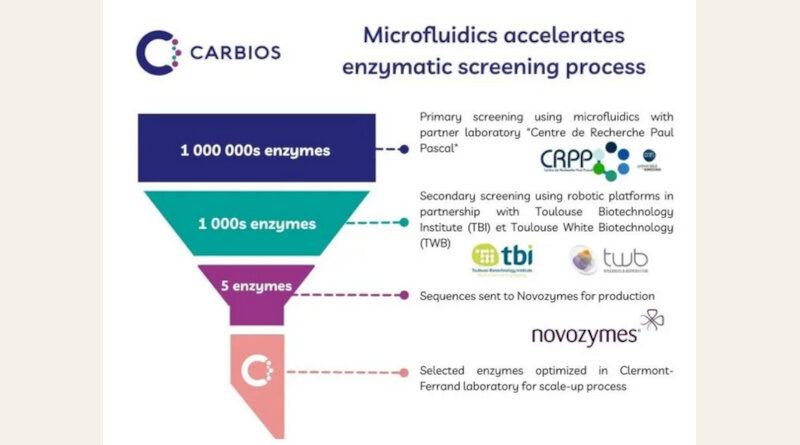Speeding up the process to optimise enzymes breaking down PET
Carbios has accelerated its enzyme screening process with a microfluidic technology developed in partnership with the Paul Pascal Research Centre (a joint research unit of the CNRS and the University of Bordeaux, which specialises in microfluidics). This cutting-edge technology enables the screening of millions of enzymes in just one day, speeding up the process to optimise enzymes breaking down PET. This advantage enables Carbios to reduce the time between the R&D phase and the production of its proprietary enzymes, and therefore to develop concrete solutions to plastic pollution even faster.
“Since having applied microfluidics to our screening process more than a year ago, we have analysed millions of enzymes, which would have taken years beforehand,” explains Prof. Alain Marty, Chief Scientific Officer at Carbios. “This technology gives access to a large variety of enzymes in record time. Microfluidics has enabled us to optimise the enzyme presented in 2020 in the journal Nature, and it is this optimised enzyme that will be used in our first industrial reference unit in 2025.”
“Microfluidics is already widely used in medical diagnostics to analyse biological samples. When Carbios approached us to use it for new industrial applications, this was a first,” said Jean-Christophe Baret, Professor at the University of Bordeaux and team leader at the Paul Pascal Research Center hosted by the CNRS. “We are very pleased to develop new methods using the power of microfluidics for an environmental cause such as the reduction of plastic pollution.”
Microfluidics: the science of droplets
Microfluidics allows the production of devices handling very small amounts of liquid. Each droplet generated can be considered as an independent microreactor having a volume in the picoliter range (10-12 liters) and containing a particular enzyme whose PET depolymerisation activity will be screened. These droplets move through analysis units the size of a microchip allowing ultra-high throughput screening of 150 enzymes per second.
Previously, conventional robotic systems allowed screening in microplate format with a volume in the milliliter range (10-3 liters) and with rates of around one enzyme per minute.
The use of microfluidics to screen for more efficient or new enzymes will become widely adopted in the coming years, therefore accelerating the development of bioprocessing. Currently used by Carbios for the development of its PET depolymerisation process, microfluidics should be used to accelerate the development of new enzymes for other types of plastic such as polyamide.
Microfluidic processes require special expertise. At present, two researchers at Carbios are dedicated to microfluidics and based in the cooperative laboratory with Toulouse Biotechnology Institute hosted by Insa (National Institute of Applied Sciences) Toulouse. Alexandra Tauzin, Researcher in Enzyme Engineering and Microfluidics, and Alexandre Gilles, Engineer specialised in robotics, work in partnership with the Paul Pascal Research Center.

